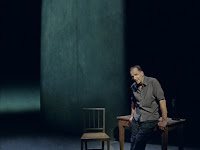Ezra Pound is probably the most advanced American modernist poet ever, but he was not just canceled for his ideology. He was committed to an insane asylum. Critics keep trying to cancel his onetime protégé T.S. Eliot for his conservatism as well, but his comparative accessibility and even greater cultural significance have helped his literary reputation withstand their efforts. In fact, Ralph Fiennes adapted Eliot’s Four Quartets for the stage, which in turn, his filmmaker sibling has transferred to the screen in T.S. Eliot’s Four Quartets, opening tomorrow in New York.
The Hollow Men and Prufrock probably have a reputation for being somewhat less dense, but it is surprising how contemporary Eliot’s Quartets sound. The opening words of Burnt Norton: “Time present and time past are both perhaps present in time future” represent a meditation on the ways humanity relates to time that could easily fit within a post-modernist reading list. However, Eliot later tries to illuminate a path out of the post-structuralist morass, through his high Anglican faith. Indeed, Fiennes recites lines from Little Gidding, like “You are here to kneel where prayer has been valid” with the reverent gravity they deserve.
It is just Fiennes on-stage, barefoot in a rumpled sportscoat, looking very much like a homeless English professor. Yet, his expressive performance and command of Eliot’s language holds up against the stark, surreally minimalist backdrop. This is definitely a spartan production, but it suits Eliot’s aesthetics.
Occasionally, Fiennes adds a modest embellishment, like the vintage microphone he speaks into during part of East Cork to evoke the Quartets’ WWII origins. Eliot’s poetry was rarely heard in Beatnik cafes with bongo accompaniment, but Fiennes finds unexpected rhythm in some of Eliot’s passages. Regardless, the clarity of his delivery lets the relevance of Eliot’s verse shine through, such as his critiques of progressive dialectical thinking, expressed as “the superficial notions of evolution.” In this era of cancelation, which constantly takes aim at Eliot, words like “A people without history is not redeemed from time” hold special resonance.
After watching and listening to Fiennes channel Eliot, it is clear the Four Quartets is a profoundly rich text that has been criminally ignored by trendy English departments. Fiennes does his verse justice. It is not the most cinematic film, but it nicely conveys a sense of Fiennes’ staging. Recommended for the highly literate, T. S. Eliot’s Four Quartets opens tomorrow (4/28) in New York, at the IFC Center.

